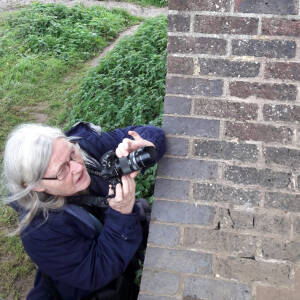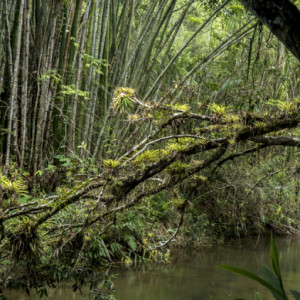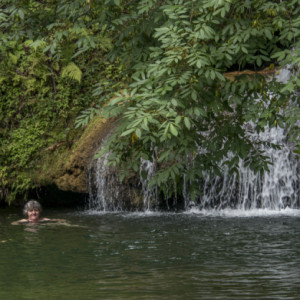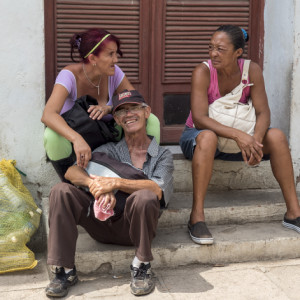Onward
We’d arranged another tour. Yes, mad after yesterday but somehow a walk in the mountains felt calming after a drunken boat trip.
A good start. Ricardo’s taxi was just a taxi – no fancy stuff – and it was shared. After collecting us and all our baggage (for moving on this evening) Ricardo drove across town to collect some fellow walkers – a young Slovakian couple who live in London – then on and up into the mountains of the Valle de los Ingenios that we gazed at a couple of evenings ago.
We pulled into a viewpoint car park to meet two more walkers (Czech! – so English wouldn’t be the day’s lingua franca) and our guide, Guillermo. He talked knowledgeably about the geography, botany, history, politics and culture of the area, and apologised that we could see little of what he was talking about as low clouds swirled round us. Excellent English and it turned out he’s a disillusioned English teacher who retrained as a guide when Cuba opened up. Hmm – disillusioned = poor on state pay? He welcomed questions and when I asked what risks he thought Cuba faced in opening up to the USA he laughed. 'We are a small island and we have stood up to them for 50 years. We are strong and we are not stupid. We will take what we want and refuse the rest.'
As he led us out of the car park and up a track he was keen for us to see and hear everything he had to show us: first a woodpecker doggedly making a hole in a telephone pole despite there being so little contact between its spindly claws and the pole that it appeared to be floating, then a row of plants growing on electric cables nourished, it seemed, only by electricity and humidity. As the foliage got thicker Guillermo told us to stop and listen to a tocororo, Cuba’s national bird. We peered though the branches towards its rhythmic chirping but it took us a while to spot the vibrant turquoise back, red belly and white chest high above us. On, in light filtered through green until we came to a clearing and a waterfall. I couldn’t see where the promised swimming place was. No, not here, that’s further on. We stopped to watch the water dance and to peer into a cave where plants were growing in thin rows where light came through cracks in the rock.
At each turn of the path we saw something new: massively tall bamboo; an arch of deciduous trees just like an English wood; a narrow trunk to cross the stream with a rickety handrail; yellow irises then over-wrought orange flowers (actually, come to think of it, irises are quite over-wrought, on a smaller scale); parasitic plants growing all along the branch of another tree (extra).
We started to feel gentle rain and walked into a clearing with a small pool. Yes, this one, fed by water tumbling over moss-covered, fern-shaded rocks at the other side. Some hessian slung round four bamboo poles was where we demurely took turns to change. I got the feeling none of us felt this was really necessary but we all conformed. Swimming in a waterfall-fed pool in the woods in the rain: the best. I’d have forgone the lunch waiting for us further along the path and stayed in the pool (extra) but we were a group. I was the last out of the water and still damp as we set off again to the restaurant in the mountains. Lunch outside, under awnings, was copious and tasty.
In the car park we met Ricardo again who drove us to the Casa de Café. We were told a little of the history of coffee growing in Cuba and shown a meagre display and a few coffee-growing implements but it was clear that the main point of this place was to get us to buy coffee. I confess to being more interested in an intricate banana flower.
Down the mountain and back into town. We were in good time for our bus on to Cienfuegos and since, for some reason, the buses were not pulling into the bus station itself but depositing and boarding passengers in the cobbled street outside, we watched the activity (extras) from the waiting room: bicycle taxis in an convivial row as they half-competed for business, crowds round a café serving window, bags being carried one way, boxes another. I was amused by the hand-painted sign on a locals’ bus showing its route between Trinidad and S Spiritus (Trinity and Holy Spirit).
From our bus we gazed through the windows and the rain: single storeyed houses with an oil drum for a water butt at the side and another on the shallow, corrugated iron roof, their verandas set into the house with clothes strung out to dry on one, women on plastic chairs chatting on another. Hens scratching by the fence; fat purple mangoes dripping from the trees; telephone wires slung from crooked poles; a high concrete water tank with a spindly metal ladder; a horse and cart; a rural shop with a shutter propped up against the rain and no customers, just a man in a purple vest sitting under a tree, waiting.
A slightly bigger one-storey building with steps cut into the grass slope in front and a red cross on a notice outside: the clinic at the edge of town. A bicycle with a bucket strapped onto its rack, two-storeyed buildings closer together; someone leaning over a first floor balcony watching children play in the street.
Cienfuegos. The first place where we’ve arranged our casa particular through an agency rather than through our previous host. We were met at the bus station, as usual, then we were handed over to someone else who drove us not to the address we expected but to somewhere two blocks away. Was this right? The driver insisted it was. At the door Barbara was effusive and bright, explaining she is the aunt of Kenia, with whom we’d been booked but who, mumble, uncertain, couldn’t host us. I still wasn’t sure whether we’d been hi-jacked but it was pouring with rain, there was a bed and she knew we were booked for two nights… Barbara introduced us to her husband Alfredo, who seemed to be asleep and stayed that way. She became brighter and more brittle. Midway through Barbara registering our details in the government-controlled casa particular book, Alfredo looked up, grimly acknowledged our presence and turned away. Then the lights and the TV went off. Powercut. Choice: darkness inside in a tense atmosphere or evening light in the rain. No contest. We extracted our waterproofs and left to explore.
Two blocks away was Calle 37, broad and stately, which runs the 4km from Pueblo Nuevo, the heart of the city, along the seafront to Punta Gorda, the beach end of town. Cienfuegos was built by French settlers and it shows immediately in the architecture but in the rain it didn’t live up to its moniker, ‘Pearl of the South’, and we ducked into Coppelia, the state-run ice cream parlour. Not really the weather for ice cream but we were out of the rain and anyway we had to try a government-made ice cream at least once.
The ice cream was prepared in an area surrounded on three sides by glass. Three staff stood outside it chatting and looking at a phone. There were more staff than customers but we were ignored. More people came in and their orders were taken languidly by a waitress who appeared from somewhere else. Then she came to take our order. We asked for a menu and she said she could tell is what was available: banana ice cream and orange ice cream. Might as well cover all bases – we ordered one of each. Both came with a white gloop of something that looked like raw meringue but which I’d seen, through the glass box, come out of an aerosol can. Both had scatters of fresh guava pieces in syrup and both were very sweet. Not bad ice cream though.
We walked towards José Marti Square in the heart of the city and were surprised to see clothes shops, two household goods shops, two supermarkets and other smaller food shops. Far more shops than we’ve seen anywhere else and, it seemed from peering through the windows, much better stocked.
Back at our casa particular, Barbara's two teenage children had returned from their evening work in their aunt’s restaurant. I said hello to the son; he grunted back. The daughter didn’t even look at us. Clearly there was disagreement in the house about having visitors. We made a rapid decision to move on to Havana tomorrow night rather than the following morning. Barbara kept her hostess demeanour but was obviously displeased. She made one call from my list to help us find a place in Havana but when it was full she handed me the phone to carry on. Gulp. My first ever phone call in Spanish. Full. My second ever phone call in Spanish. Full. My third ever phone call in Spanish... Finally one woman said she could offer us one night. ‘Yes! Please!’
We’ll sort out Saturday and Sunday nights when we get there.




Comments
Sign in or get an account to comment.


